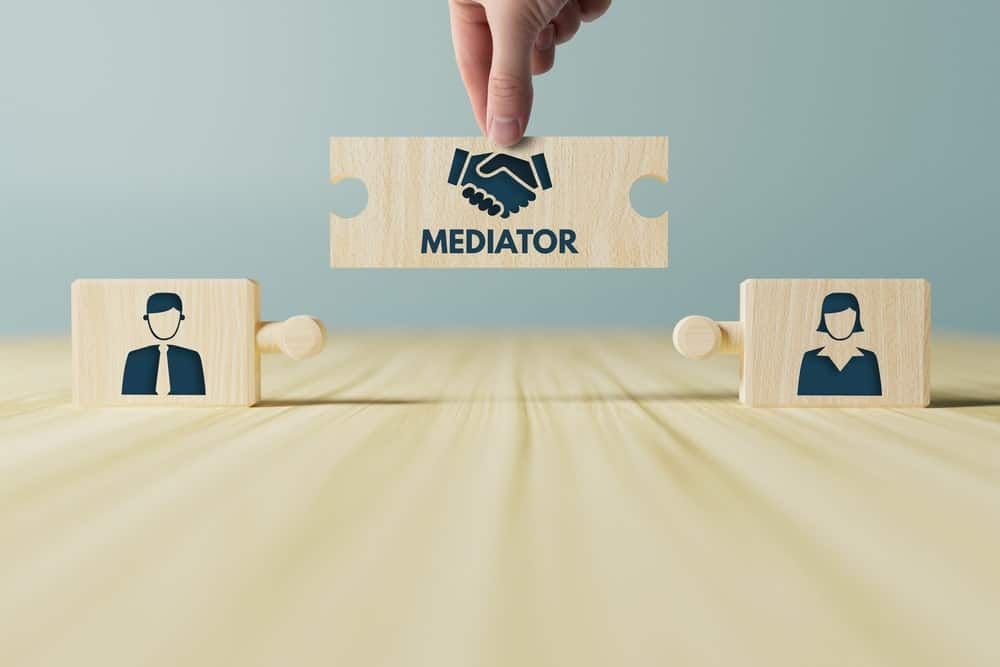
It is an unfortunate reality that many marriages and common-law relationships break down, ending in separation or divorce. If that happens to you, there will be many issues to resolve as you and your partner attempt to unwind your lives together and move forward.
Family disputes can get complicated and costly, and the prospect of going to court may leave you feeling uncertain and frightened.
However, litigation is not the only way to settle a family-related dispute – in fact, most cases are settled outside the courtroom, through processes of negotiation, mediation, and arbitration, which are collectively referred to as alternative dispute resolution (“ADR”).
Negotiation
Negotiation is the simplest form of alternative dispute resolution, and it is something we all practice every day. Negotiation can be as simple as sitting down together at the kitchen table to see if you can come to an agreement.
While this approach may be attractive as a means of avoiding legal fees, it can be difficult to negotiate an agreement if you are not sure what your rights and obligations are. It is also unlikely to be a good option if your separation involves significant conflict, or if there is any abusive behaviour.
On the other hand, if you and your spouse have retained lawyers, negotiation can still be conducted with their help by having your lawyers exchange without prejudice communications in which both parties identify their concerns, make proposals, and explore options for how your affairs might be settled. This approach allows you to negotiate while having the benefit of legal advice about what your rights are. In the best scenarios, this kind of negotiation can lead to agreement on some or all of your issues, which your lawyers can then reduce to a written agreement that can be submitted to court for approval.
However, not all disputes can be successfully resolved through negotiation. If that is your case, the next step may be to seek out the assistance of a third party who is specially trained to help disputing parties find common ground.
Mediation
Mediation is a process where a third party, known as a mediator, will work with both sides and their lawyers to try to help the parties reach a resolution. The mediator must be neutral, and both parties must agree to attend mediation, and agree on who the mediator will be.
Mediators are skilled communicators and excellent listeners who are typically family lawyers with specific training in how to conduct ADR sessions. They will hear each party’s side of the story and make suggestions on where compromises can be made. Mediated solutions are reached by consent, and it is never the job of the mediator to dictate an outcome. Rather, their goal is to help the parties communicate and come to a solution that they both consider to be satisfactory.
There are many positives to the mediation process. For one thing, it is typically much faster and less expensive than going through the court system. Mediation can also be friendlier than litigation, which may be important if you and your spouse will need to continue to work together, for example in co-parenting your children. Mediation works best when parties are willing to negotiate honestly and in good faith, and can set aside their personal differences to prioritize a resolution.
Prior to the mediation, you and your lawyer will discuss what you hope to achieve, your ideal goals and outcomes, and areas where you may be willing to make a compromise. The mediator will not provide legal advice; that is your lawyer’s job. During the mediation, the mediator will instead act as a “go between” to help facilitate communication between you and your spouse. However, the mediator cannot force the parties to agree, and cannot impose an outcome.
Mediation typically takes between 6 – 10 hours, and may be spread over one or more sessions. It is an informal and confidential process, and is usually conducted in a meeting room at the mediator’s offices. In most cases, the mediator meets with both parties and their lawyers together in the same room, but may also spend part of the time in separate discussions with each of the parties in an attempt to broker a deal.
Any agreement reached by the parties is not legally binding. To have a legally enforceable resolution flow from a mediation, it must be reduced to writing and registered with the courts.
Because mediation allows you to be directly involved in crafting the settlement of the issues between you and your spouse, you may feel more in control of the process. Mediation will inevitably require some compromise, and you may have to give up some things in order to reach a resolution. However, the input from both parties may allow the mediator to help you and your spouse arrive at an agreement that is customized and strikes a good-enough balance between the particular concerns you each have.
Arbitration
Arbitration is a bit more formal than mediation – though still less formal than courtroom litigation – and is presided over by a specially trained person known as an arbitrator.
Typically, before starting mediation, the parties will have signed a mediation/arbitration agreement providing that if their attempts at mediation fail, the process will then shift from mediation into arbitration. The agreement will usually provide that the same person who acted as mediator will then change hats and become the arbitrator.
Once again, the arbitrator will listen to both sides of the dispute carefully. However, unlike mediation, the arbitration decision does not require the parties to come to a consensual agreement. Instead, after considering the issues, the arbitrator will make one or more arbitral awards that dictate the outcome of the parties’ dispute. The awards are binding on both parties, and typically there is only a limited right to appeal.
Like mediation, arbitration lets each party have input into the process. The arbitrator can make suggestions and may propose some areas where compromises can be made. However, in the end, the arbitrator will make a decision that both parties will have to abide by.
Arbitration can provide you with closure because the arbitrator will make a final decision. However, you and your spouse can choose who will arbitrate your dispute, and you can still have some input into the overall process. Arbitration also usually proceeds more quickly than litigation, and will involve less cost.
Conclusion
Although the image many people have of divorce proceedings involves courtroom theatrics, the reality is that the vast majority of family law disputes are resolved without going to court. It is widely agreed that prolonged or high conflict divorces cause a great deal of damage to the participants, including very negative impacts on children. As a result, family law processes now strongly encourage couples to pursue ADR methods wherever possible.
If you and your spouse have separated, or are contemplating separation, and you have questions about the best way to resolve your family law dispute, the experienced lawyers at Spectrum Family Law may be able to provide you with the guidance you need. Contact one of our experienced family lawyers today. Our team understands the complexities that come with navigating sensitive family matters, especially when significant assets and financial matters are involved. As trusted Alberta high networth divorce lawyers, we have the expertise to help you protect your interests and achieve a fair outcome. Let us assist you in making informed decisions for your future and the well-being of your family.

We currently have three offices across Alberta — Edmonton, Calgary, and Red Deer. We serve the entire province of Alberta (and BC). We also have the infrastructure to work with any of our clients virtually — even the furthest regions of Alberta.
Call 1 (855) 892-0646 (toll free) to get routed to the best office for you or contact us online for general inquiries.
We also have a dedicated intake form to help you get the ball rolling. Our intake team will review your specific case and advise you on the next steps to take as well as what to expect moving forward. That’s the best way to schedule an appointment
Our offices are generally open 8:30 a.m.—4:30 p.m., Mon—Fri.


Jon Dowhaluk
PARTNER
Jon has a wealth of experience advocating for his clients in judicial, quasi-judicial as well as in dispute resolution venues. Jon appreciates the difficulties of dealing with each person’s unique family situation and is very experienced advocating for his clients to ensure their best interests are protected.
The Legal Review Process by Spectrum Family Law
- Spectrum strives for high-quality, legally verified content.
- Content is meticulously researched and reviewed by our legal writers/proofers (usually local law students).
- Details are sourced from trusted legal sources like the Family Law Act.
- Each article is edited for accuracy, clarity, and relevance.
- If you find any incorrect information or discrepancies in legal facts, we kindly ask that you contact us with a correction to ensure accuracy.


